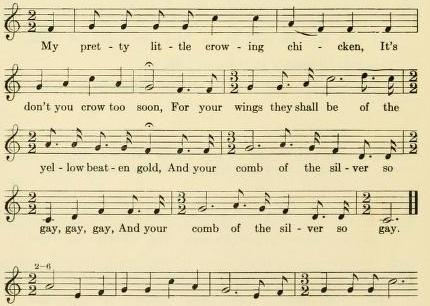Pretty Polly- Miller (NC) 1936 Brown 4A
[From Brown Collection of NC Folklore, Vol 4, version A, which corresponds to Vol. 2 version A. There are 7 versions of text A-G plus additional versions with music in Vol. 4. It's unclear whether this is the version collected by Sutton, which is Brown A. It seems unlikely the text would be the same and included the "little crowing chicken" a text unique to Brown A. The 1936 date seems wrong in 4A and it would need to be earlier to be collected by Sutton. The date would be in the 1920s before Miller was married and her name was Myra Barnett.
R. Matteson 2014]
OLDER BALLADS MOSTLY BRITISH
Lady Isabel and the Elf-Knight (Child 4)
For the history of this ballad in many lands and tongues, see Child's headnote in English and Scottish Popular Ballads and Grundtvig's in Danmarks gamle Folkeviser, and for its occurrence since Child's time in the British Isles and in America, see BSM 5-6 — and add to the references there given Arkansas (OFS I 47), Florida (FSF 237-41), and Missouri (OFS I 45-6). It is a favorite among the ballad singers of North Carolina; Mrs. Sutton reports that it was sung by Mrs. Hall in Buncombe county, by Mrs. Gordon in Henderson county, by Mrs. Brown in Avery county, and others. Mrs. Steely records three texts, with tunes, found in the Ebenezer community in Wake county. The name of the heroine varies. Most often it is Polly. The names Clovanne (in version C) and Cold Rain (in version D) may be assumed to derive from the May Colvin of British broadside versions. The villain, if named at all — as generally he is not in the North Carolina versions — is William. All three of the scenes that make up the story, the elopement, the drowning, the dialogue with the parrot, are present in all the North Carolina versions, even the much reduced F. Versions D, E, and G show the shift of grammatical person from the first person to the third which is so frequent in traditional balladry.
A. 'Pretty Polly.' Sung by Mrs. Myra Barnett Miller, Lenoir, Caldwell county. Recorded at Lenoir, August 1936. There is another, very similar recording by the same singer (record XXXA2-4), with the additional titles 'The Seventh King's Daughters' and 'The Seven Sisters.' The variations are those of this second recording, also in score No. 140.

For melodic relationship, cf. ***SharpK i, No. 3 A, D, G; **OFS 1, No. 2A; *BBM 24, F; ASb 60-61 ; PSL 30; TBV 549-50; and FSS No. iB.
Scale: Mode III, plagal. Tonal Center: f. Structure: aa1a2bb1 (2,2,2,2,2) = aa1b (4,2,4). Circular Tune (V).
1 'My pretty little crowin' chicken,
It's don't you crow too soon,
And your wings shall be of the yellow beaten* gold
And your comb of the silver so gay gay gay
And your comb of the silver so gay.'
2 She stole her father's horses,
And she rode the dappled bay.
And she travelled till she came to the salt-water sea
Six hours before it was day day day,
Six hours before it was day.
3 'Light down, light down, pretty Polly,
And stand by the side of me.
For the six king's daughters that I have drowned here.
And the seventh daughter you shall be be be.
And the seventh daughter you shall be.
4 Pull off, pull off those fine, fine clothes
And give them unto me;
For I do think that they're too costly and too fine
To rot in the salt-water sea sea sea.
To rot in the salt-water sea.'
5 'Oh turn your back all unto me
And your face to the leaves on the tree;
For I do think it's a scandal and a shame
That a naked woman you should see see see,
That a naked woman you should see.'
6 He turned his back all unto her
And his face to the leaves on the tree.
She picked him up so manly and so strong
And pitched him into the salt-water sea,
And pitched him into the sea.
7 'Lie there, lie there, you false-hearted man,
Lie there in the place of me.
For the six king's daughters that you have drowned there,
And the seventh daughter you shall be be be.
And the seventh daughter you shall be.'
8 She rode her father's horse
And she led the dappled bay,
And she rode till she came to her own father's house
Three hours before it was day day day.
Three hours before it was day.
9 'Oh, where have you been, pretty Polly,
So long before it is day?'
[O 'Oh, hush, oh, hush, my little parrot,
And tell no tales on me,
And your cage it shall be of the yellow beaten gold
And the doors of the ivory ry ry.
And the doors of the ivory.